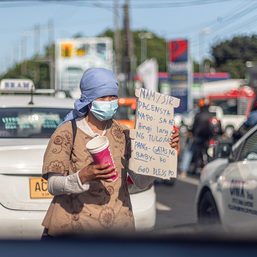SUMMARY
This is AI generated summarization, which may have errors. For context, always refer to the full article.

MANILA, Philippines – The Supreme Court (SC) has ruled in favor of five riders who alleged that their employer Lazada illegally dismissed them in 2017.
In a decision promulgated on September 21, 2022, but released to the media on Friday, January 20, the SC challenged the rulings of the National Labor Relations Commission (NLRC) and the Court of Appeals, which found that there was no employer-employee relationship between the petitioners and Lazada E-Services Philippines, Incorporated.
The SC ordered Lazada to reinstate the petitioners – Chrisden Ditiangkin, Hendrix Molines, Harvey Juanio, Joselito Verde, and Brian Anthony Nabong – to their former positions as Lazada riders.
They will receive full backwages computed from the time of dismissal up to the time of actual reinstatement. The case was brought to the Labor Arbiter for the computation of the total monetary benefits that the petitioners were entitled to.
Finding an employer-employee relationship
In February 2016, the petitioners were hired by Lazada with the primary task of transporting items from sellers and to Lazada’s warehouse. They earned P1,200 each per day for one year, as stipulated in their contracts.
Sometime in January 2017, a dispatcher told the riders that they were removed from their usual routes, and will no longer be given schedules. The riders still reported to work for three more days, waited all day for new assignments, but were not given any. They learned that their routes were already given to other employees.
This prompted the riders to file an illegal dismissal complaint against Lazada with the NLRC. They claimed that they were regular employees of Lazada, as the means and methods by which they carry out their work is subject to the discretion and control of Lazada.
Lazada, meanwhile, maintained that the riders were not their regular employees, but independent contractors. The company argued that when a buyer purchases an item through Lazada, the company merely coordinates the delivery of the product through an independent transportation service. This made delivery merely an ancillary activity, and not its main line of business.
The Labor Arbiter dismissed the riders’ complaint, ruling that they were not regular employees of Lazada. The NLRC and the Court of Appeals upheld this.
The riders elevated the case to the SC, which found that Lazada failed to discharge its burden of proving that the riders were independent contractors rather than regular employees.
“When the status of the employment is in dispute, the employer bears the burden to prove that the person whose service it pays for is an independent contractor rather than a regular employee with or without fixed terms,” read the decision penned by Senior Associate Justice Marvic Leonen.
The SC used a two-tiered test to determine whether an employer-employee relationship existed between Lazada and the petitioners: the four-fold test, and the economic-dependence test.
The High Court found that all four factors in the first test were present:
- Employer’s selection and engagement of the employee
- Payment of wages
- Power to dismiss
- Power to control the employee’s conduct
The SC ruled that the riders were directly employed by Lazada because they signed contracts with the company. They also received their salaries from Lazada, and the company had the power to terminate them.
Lazada also directed their work through requiring the accomplishment of a route sheet which kept track of the arrival, departure, and unloading time of the items. The riders were also required to submit trip tickets and incident reports to Lazada.
Since delivery of items is integrated in the services offered by Lazada, the SC also held that the services performed by the petitioners were integral to Lazada’s business.
The case also passed the economic-dependence test, as the riders were hired by Lazada directly after being previously engaged by a third-party contractor to provide services for Lazada. This means that the petitioners were economically dependent on Lazada for their livelihood.
“Protection of the law afforded to labor precedes over the nomenclature and stipulations of the contract…. Thus, it is patently erroneous for the labor tribunals to reject an employer-employee relationship simply because the Contract stipulates that this relationship does not exist,” the SC decision read.
Labor rights group Partido Manggagawa hailed the decision.
“Magandang desisyon ng Korte para sa ating mga delivery riders (This is a good decision by the Court for our delivery riders),” it said on its Facebook page. – Rappler.com
Add a comment
How does this make you feel?










![[OPINION] Unpaid care work by women is a public concern](https://www.rappler.com/tachyon/2024/07/20240725-unpaid-care-work-public-concern.jpg?resize=257%2C257&crop_strategy=attention)






There are no comments yet. Add your comment to start the conversation.